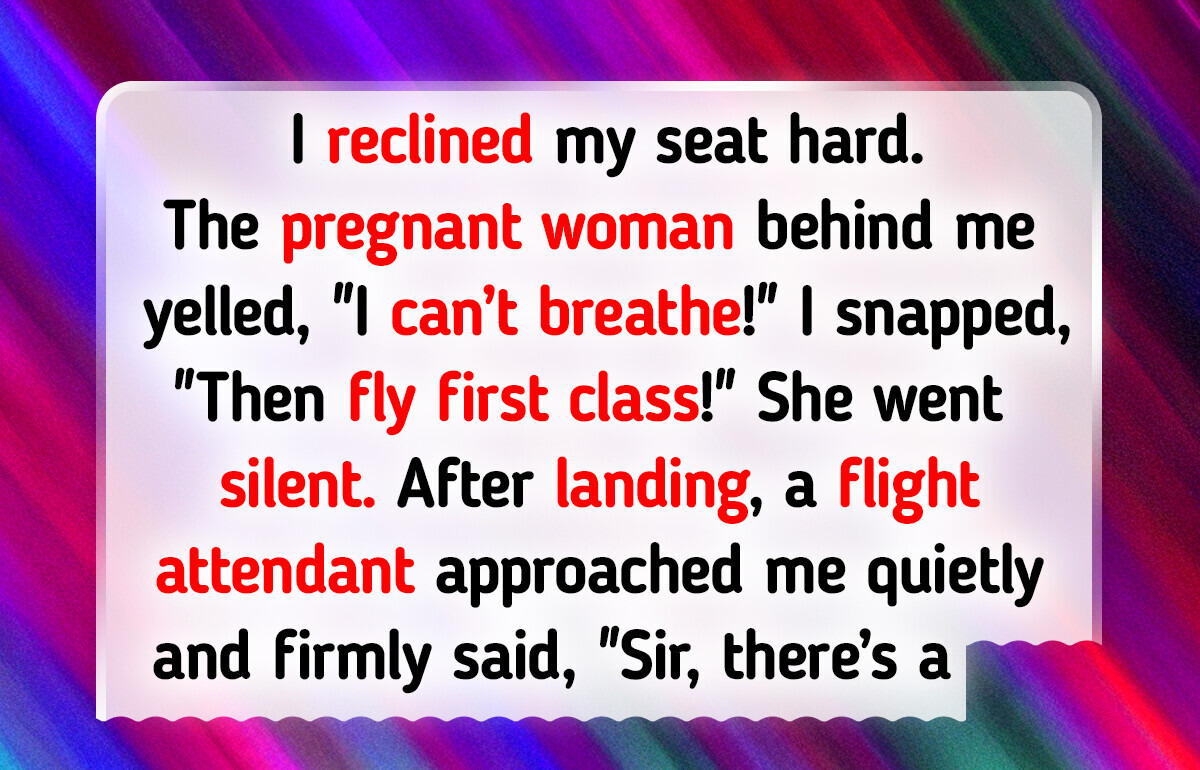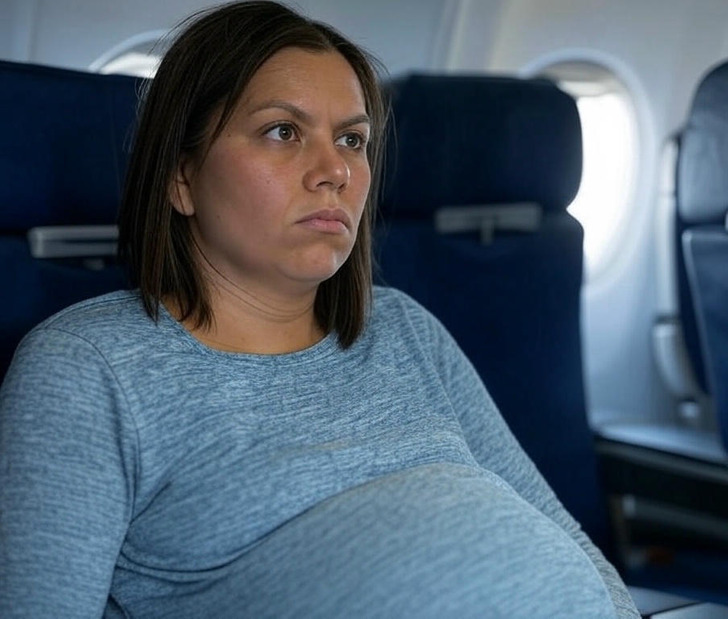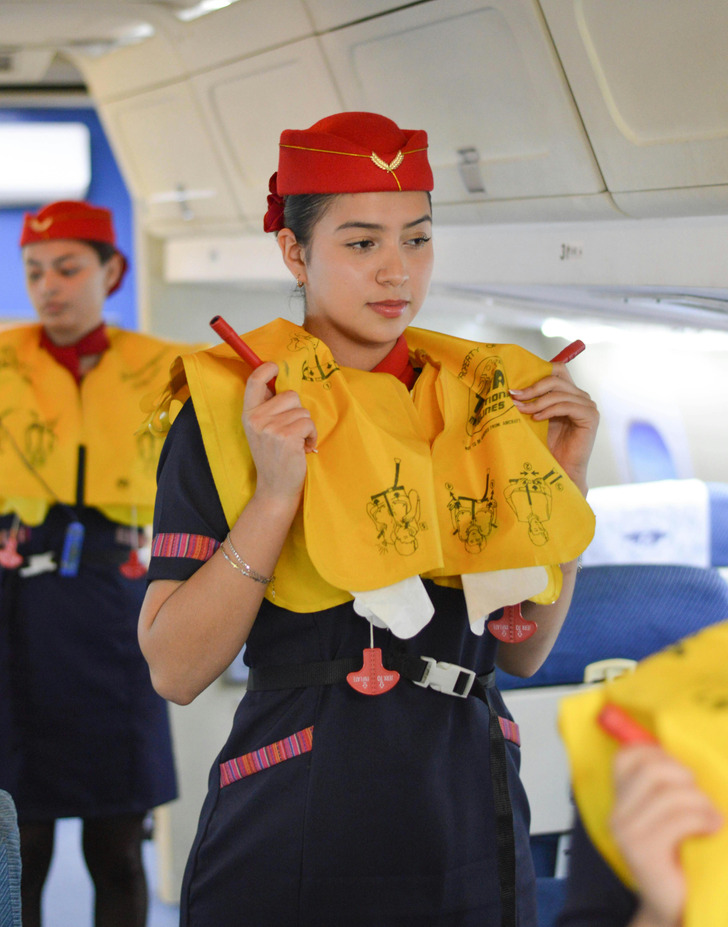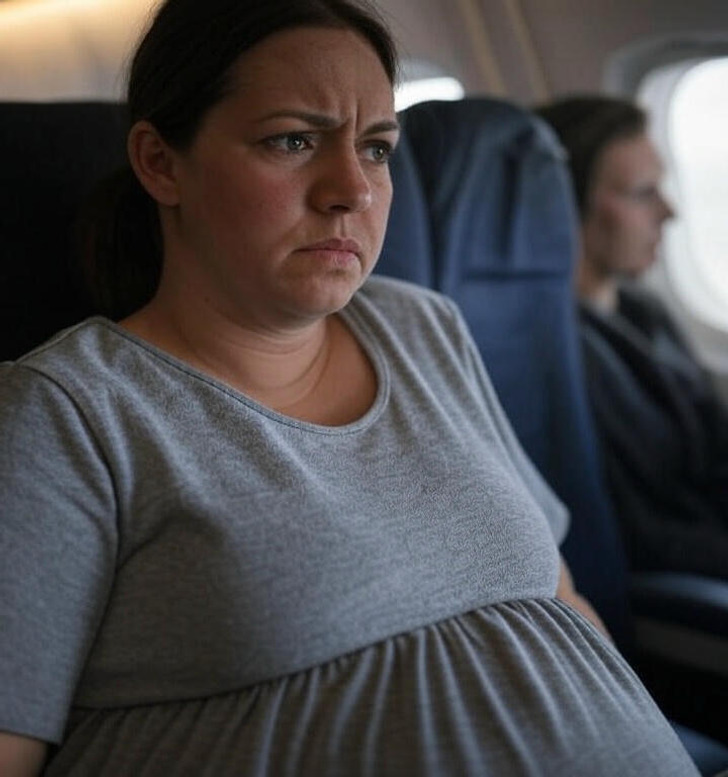I think a little more spatial awareness would have courteous in this instance. Of course you can recline your seat if that facility exists, but NOT at the expense of the person immediately behind you.
I Know It Might Bother You, But I’m Still Reclining My Seat

Today, we're addressing a social dilemma many of you have faced - the airplane seat recline controversy. When does your right to comfort infringe upon another's personal space? We received a letter from Mark that perfectly captures this tension after his interaction with a pregnant passenger seated behind him. His story touches on exhaustion, entitlement, and the complex social dynamics of air travel in cramped conditions. As you read Mark's letter and our response, we invite you to consider how you might have handled the situation from either perspective.
Here is Mark’s letter:

Hello NISE,
I (34M) was on a 6-hour flight yesterday returning from a business trip. It was one of those budget airlines with the cramped seats, and I had specifically booked an aisle seat since I'm 6'3" and need whatever extra space I can get. I paid extra for that specific seat assignment.
The flight was delayed by 2 hours, and by the time we finally boarded, I was exhausted and irritable. I had pulled an all-nighter to finish a presentation for a client meeting that morning, which thankfully went well, but I was running on fumes.
As soon as the seatbelt sign went off, I decided to try to get some sleep. Without looking behind me, I reclined my seat hard. The pregnant woman behind me yelled, "I can't breathe!" I was startled but honestly too tired to care.
I snapped, "Then fly first class!" She went silent.
My seatmate gave me a weird look, but I just put on my noise-canceling headphones and dozed off for most of the flight. I didn't think much about the interaction until later.

After landing, a flight attendant approached me quietly and firmly said, "Sir, there's something you might want to check." She handed me a note. It was from the woman behind me explaining that she was 8 months pregnant and had been experiencing discomfort throughout the flight. The sudden recline had pressed against her stomach, causing her distress. She wrote that she couldn't afford first class as she was traveling to see her sick mother one last time before giving birth.
Now I feel conflicted. My wife says I was completely in the wrong and should have been more considerate. She's been giving me the cold shoulder since I got home and told me I need to "fix this somehow."
My brother, on the other hand, says that reclining seats are a feature of the airplane that I'm entitled to use, and the woman should have spoken to me politely first rather than yelling about not being able to breathe, which he thinks was an exaggeration.
I keep going back and forth on this. Was I being reasonable given how exhausted I was, or should I have checked behind me first? If the seats recline, doesn't that mean we're allowed to use that feature? But then again, I can't stop thinking about her situation.
Am I the bad guy for using the recline function on my seat even though it caused distress to a pregnant woman?
Hi Mark! Thank you for sharing your experience with us. We’ve put together some advice that might be useful for similar situations in the future.
The Right to Recline vs. The Duty to Consider Others
You mentioned paying extra for your aisle seat and feeling entitled to use the recline feature. While airline seats are designed to recline, this feature doesn’t eliminate our responsibility to consider those around us. Your exhaustion after an all-nighter and delayed flight is something many business travelers can relate to, creating a perfect storm for frayed nerves and quick reactions. The confined space of economy class creates an environment where one person’s comfort can directly impact another’s well-being, especially in cases involving pregnant passengers, elderly individuals, or those with physical limitations. These shared spaces require us to balance our own needs with awareness of how our actions affect others, even when we’re tired and stressed.
The Impact of Your Response

As a mom I think you don't have any respect for women. Your excuse for being exhausted is lame. I feel sorry for your wife & the poor woman you made so uncomfortable. A real man would have moved that seat back up to make her comfortable & apologize to her.
Your immediate reaction to the pregnant woman's distress – suggesting she should fly first class – reveals something important about travel etiquette. When we respond with dismissiveness to someone's physical discomfort, we create ripples that extend beyond that moment. Your seatmate's reaction and the flight attendant's intervention suggest that others perceived your behavior as crossing a line of basic courtesy. The revelation that the woman was eight months pregnant and traveling to see her sick mother adds emotional weight to the situation that wasn't apparent in the heat of the moment. The fact that you're still thinking about this interaction indicates that you recognize something was amiss in how the situation unfolded, despite your exhaustion serving as a contributing factor to your reaction.
Finding Middle Ground in Tight Spaces

I thought airlines didn't allow women to fly that late in their pregnancy.
Your brother's perspective about being entitled to use features you paid for holds some validity but misses crucial nuance. The right to recline doesn't mean we should exercise it without regard for context or communication. A simple glance behind you before reclining, or reclining gradually rather than suddenly, could have prevented the entire situation. Your wife's reaction suggests she recognizes what many frequent flyers understand: air travel requires a social contract beyond what's explicitly stated in the ticket terms. Even when we're exhausted, a moment of consideration can prevent someone else's significant discomfort. The airline industry has created this problem by reducing the space between seats while maintaining the recline function, essentially pitting passengers against each other in the struggle for comfort.
Moving Forward with Empathy
What stands out in your letter is your willingness to question your actions, which shows character and self-awareness. The fact that you're conflicted indicates you already know that exhaustion may explain your behavior but doesn't justify it. Your brother's defense focuses on technical rights, while your wife's response centers on human empathy – and in matters of public spaces, empathy often serves us better than strict adherence to what we're technically allowed to do. Consider how you might feel if your pregnant wife were in that woman's position, unable to escape the discomfort caused by someone else's actions. While you can't change what happened, you can let this experience inform how you navigate similar situations in the future, perhaps by checking behind you before reclining or reclining gradually to allow the person behind you to adjust.

Mark, we all have moments where exhaustion clouds our better judgment, and tight spaces like airplanes can bring out difficult sides of ourselves. What matters now is not beating yourself up about what happened but recognizing that in shared spaces, our comfort shouldn't come at the significant expense of others' well-being. The next time you fly, this experience will likely make you more mindful of the people around you – and that awareness is the silver lining of this uncomfortable situation. We believe most people try to do the right thing most of the time, and your reflection on this incident suggests you're no exception.
This flight took an unexpected turn when a woman attempted to claim a reader’s seat for her child. Here’s what happened.
Comments
The OP should have considered First Class if he really needed the comfort and rest so much.
The OP was perfectly justified in using the recline feature of his seat. While moving it back quickly might have caused contact with the woman behind him, it might not have. She might have been using her pregnancy (and the story about her sick mother and a ‘last visit’ before the baby is born) as a way to try to guilt him into compliance with her wishes - since someone apparently anointed her queen of the airplane. If, as the article suggests, we must all be aware of the needs of other around us, she should have recognized his need for sleep. Further, she should have recognized the fact she didn’t elect to fly First Class and has to deal with the space limitations of a coach seat, just like all the rest of us. She can recline her seat to create more room for herself. Trying to guilt this man into submission is bullying, plain and simple.
Related Reads
6 Dementia Symptoms You May Not Realize Right Away

20+ People Who Barely Recognize Themselves in Old Photos

10+ Poop Red Flags That Could Be Hiding Serious Health Issues

My Son’s Belly Hurt Every Time He Visited My MIL — and the Truth Left Me Speechless

5+ Alarming Signs That Scream Colon Cancer Might Be Present

My MIL Publicly Shamed Me at My Wedding — Then She Got a Harsh Reality Check

She Was Called the Most Beautiful Girl in the World — Today Her Look Sparks Heated Controversy

From Red Carpets to Parenthood: Vincent Cassel, 58, Starts Over with 28-Year-Old Model

15+ Bizarre Things That Made People Question Everything

15 Celebrities You Probably Only Remember Older — Their Younger Selves Were Absolute Stunners

I Refused to Be Called Grandma — And It Destroyed My Family

A Woman’s Face Was Marked Against Her Will — But She’s Finally Getting It Removed


